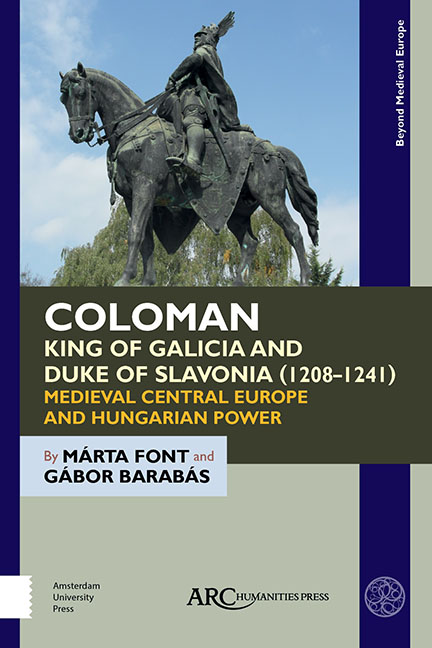 Coloman, King of Galicia and Duke of Slavonia (1208–1241)
Coloman, King of Galicia and Duke of Slavonia (1208–1241) Book contents
- Frontmatter
- Contents
- List of Illustrations
- Foreword
- Introduction
- PART ONE COLOMAN AS CHILD RULER OF GALICIA
- Chapter 1 The Galician Context in 1205
- Chapter 2 The Agreement of Scepus
- Chapter 3 Coloman’s Coronation as King of Galicia: Date and Place
- Chapter 4 The Hungarian Elite and Coloman’s Court
- Chapter 5 Coloman’s Position in Halych, 1215–22: Campaigns and Opponents
- Chapter 6 Upholding the Galician Claim: Coloman’s Place in Hungary
- PART TWO COLOMAN, DUKE OF WHOLE SLAVONIA (1226–1241)
- Chapter 7 Coloman and Scepus, Before 1226
- Chapter 8 Coloman as Duke of Whole Slavonia from 1226
- Chapter 9 Coloman’s Status and the Inner Workings of the Duchy
- Chapter 10 Coloman’s Ecclesiastical and Secular Actitivities in Slavonia
- Chapter 11 Coloman’s Rule in Slavonia
- Chapter 12 Politics and Dynastic Affairs
- Chapter 13 Challenges in the Balkans
- Chapter 14 The Mongol Attack and Coloman’s Death
- Conclusion: Coloman in the Eyes of Posterity
- Bibliography
- Index
Conclusion: Coloman in the Eyes of Posterity
Published online by Cambridge University Press: 20 November 2020
- Frontmatter
- Contents
- List of Illustrations
- Foreword
- Introduction
- PART ONE COLOMAN AS CHILD RULER OF GALICIA
- Chapter 1 The Galician Context in 1205
- Chapter 2 The Agreement of Scepus
- Chapter 3 Coloman’s Coronation as King of Galicia: Date and Place
- Chapter 4 The Hungarian Elite and Coloman’s Court
- Chapter 5 Coloman’s Position in Halych, 1215–22: Campaigns and Opponents
- Chapter 6 Upholding the Galician Claim: Coloman’s Place in Hungary
- PART TWO COLOMAN, DUKE OF WHOLE SLAVONIA (1226–1241)
- Chapter 7 Coloman and Scepus, Before 1226
- Chapter 8 Coloman as Duke of Whole Slavonia from 1226
- Chapter 9 Coloman’s Status and the Inner Workings of the Duchy
- Chapter 10 Coloman’s Ecclesiastical and Secular Actitivities in Slavonia
- Chapter 11 Coloman’s Rule in Slavonia
- Chapter 12 Politics and Dynastic Affairs
- Chapter 13 Challenges in the Balkans
- Chapter 14 The Mongol Attack and Coloman’s Death
- Conclusion: Coloman in the Eyes of Posterity
- Bibliography
- Index
Summary
SURPRISINGLY, TILL RECENTLY Coloman was of greater interest to Ukrainian, Slovak, and Croatian scholars than Hungarian historians. The main focus was on him as King of Galicia. His evaluation has been heavily dependent on his role in different national histories.
In Hungary, the first monograph dedicated to Prince Coloman was the Hungarian version of this same book, published only in 2017. A few studies concentrating on his life or his coronation had appeared in the late nineteenth and early twentieth century, but thereafter he only appeared in specific contexts: his life in Halych and in the Scepus, or his role as duke of Slavonia. For instance, the famous Hungarian medievalist Gyula Kristó’s university textbook also follows this approach: Coloman only appears in the context of Hungarian expansion in Galicia, or concerning the relations between King Andrew II and Prince Béla. Not surprisingly, Coloman received more attention in Kristó’s monograph on the history of the Hungarian territorial reigns where he analyzed the nature of his rule, but nothing on his activities. Tibor Almási went further in his entry in the Korai Magyar Történeti Lexikon (Lexicon of Early Hungarian History), emphasizing that Coloman’s policies were fairly independent of his father and emphasizing his peaceful relationship with his older brother, Béla.
The extraordinary brotherly peace between Coloman and Béla became the subject of a fictional work in 1930. György Büky’s short story “Prince Coloman” was published in Napkelet, a conservative post-first world war magazine. In this short story, Hungarian noblemen gathered in Buda (sic!) at the royal palace where Coloman was present, intending to complaint about the absent king, Béla, who had repeatedly wronged them in many ways. But Coloman refused to hear them out and emphasized his loyalty to his brother. We do not intend to rake through a fictional story for historical authenticity, nor its many inaccuracies, such as his one-year period in Galicia, but the good relation between Béla and Coloman became a literary inspiration and paradigm. Another quaint element to the tale is the statement that Coloman only married Salomea to help defend against the Mongol threat.3 We see here an interplay between historical accuracy and fiction and reaching a wider public.
- Type
- Chapter
- Information
- Coloman, King of Galicia and Duke of Slavonia (1208–1241)Medieval Central Europe and Hungarian Power, pp. 127 - 132Publisher: Amsterdam University PressPrint publication year: 2019


